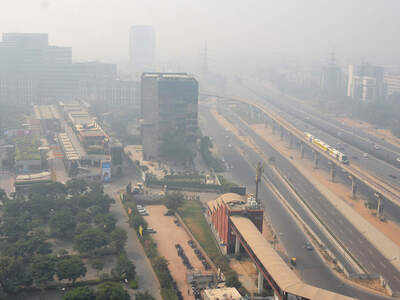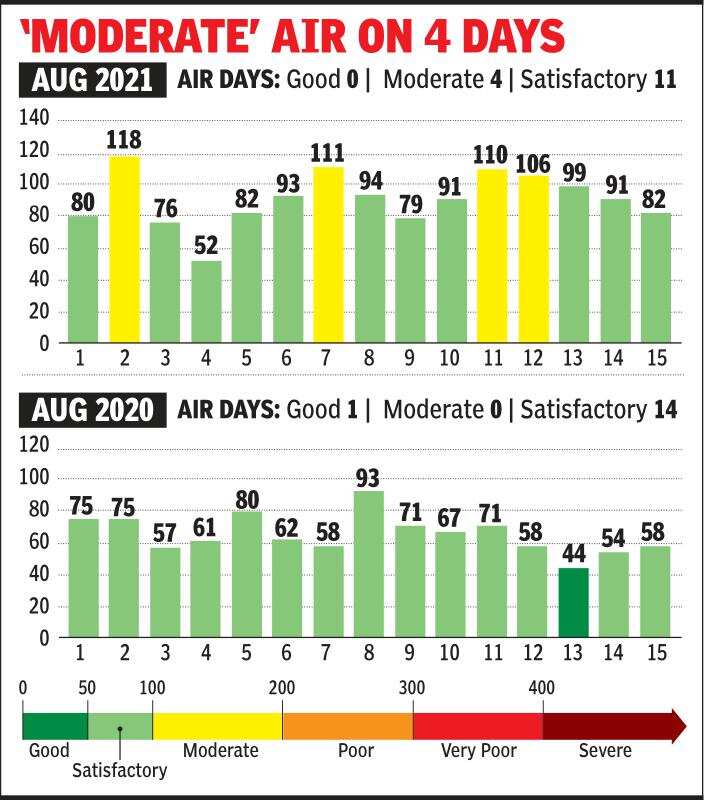- News
- City News
- gurgaon News
- 2021 vs 2020: August gasps for one ‘good’ air day in Gurugram this year
2021 vs 2020: August gasps for one ‘good’ air day in Gurugram this year

According to HSPCB, low wind speed and local factors such as garbage burning and dust from construction sites have contributed to the deterioration of air quality in August this year.
GURUGRAM: The air quality index (AQI) recorded in Gurugram in the 15 days of August is worse than the same period last year. This month, the city has not recorded a single ‘good’ air day.
Track the pollution level in your city
Gurugram, however, saw 11 ‘satisfactory’ AQI days this August. In comparison, 14 ‘satisfactory’ air days and one ‘good’ air day was recorded in August 2020. Moreover, last year during the same period, no ‘moderate’ days were recorded. A total of four ‘moderate’ days have been reported this August so far.

According to the Haryana State Pollution Control Board (HSPCB), low wind speed and local factors such as garbage burning and dust from construction sites have contributed to the deterioration of air quality in August this year.
An AQI between zero and 50 is considered ‘good’, 51 and 100 ‘satisfactory’, 101 and 200 ‘moderate’, 201 and 300 ‘poor’, 301 and 400 ‘very poor', and 401 and 500 ‘severe’.
“We have witnessed less ‘satisfactory’ days this August in the region, which is a big concern. The main reason is that there is no lockdown. While the city received rainfall this month, which cleared pollutants from the air, local factors played an important role in trapping pollutants. This deteriorated the air quality index,” HSPCB member secretary S Narayan told TOI.
“This August, the poisonous gases from waste burning and dust from construction sites have also contributed to air pollution in Gurugram. We cannot deny the role of these factors while analysing the city’s AQI,” he added.
Meanwhile, the air quality is likely to improve in the coming days as the temperature in the region is expected to rise. “We are following suggestions made by the Commission for Air Quality Management (CMAQ) regarding monitoring of crop residue burning. We are hopeful that things will improve in the coming winter,” he added.
On Sunday, the city’s overall AQI stood at 82. The Sector 51 monitoring station recorded ‘satisfactory’ AQI at 84), Vikas Sadan at 67, and Teri Gram at 96.
Independent experts pointed out that ozone is also an emerging problem in Gurugram. Sachin Panwar, a city-based independent air quality scientist, said, “Ozone is only a summer problem and is not a concern during monsoon months. It is now well-understood that sunshine plays a critical role in triggering photochemical reactions between gases to form ozone and it is typically expected that ozone is a bigger problem in summer. But the problem seems to be quite uniformly spread across seasons. Thus, this has deteriorated the AQI in the city.”
Track the pollution level in your city
Gurugram, however, saw 11 ‘satisfactory’ AQI days this August. In comparison, 14 ‘satisfactory’ air days and one ‘good’ air day was recorded in August 2020. Moreover, last year during the same period, no ‘moderate’ days were recorded. A total of four ‘moderate’ days have been reported this August so far.

According to the Haryana State Pollution Control Board (HSPCB), low wind speed and local factors such as garbage burning and dust from construction sites have contributed to the deterioration of air quality in August this year.
An AQI between zero and 50 is considered ‘good’, 51 and 100 ‘satisfactory’, 101 and 200 ‘moderate’, 201 and 300 ‘poor’, 301 and 400 ‘very poor', and 401 and 500 ‘severe’.
“We have witnessed less ‘satisfactory’ days this August in the region, which is a big concern. The main reason is that there is no lockdown. While the city received rainfall this month, which cleared pollutants from the air, local factors played an important role in trapping pollutants. This deteriorated the air quality index,” HSPCB member secretary S Narayan told TOI.
“This August, the poisonous gases from waste burning and dust from construction sites have also contributed to air pollution in Gurugram. We cannot deny the role of these factors while analysing the city’s AQI,” he added.
Meanwhile, the air quality is likely to improve in the coming days as the temperature in the region is expected to rise. “We are following suggestions made by the Commission for Air Quality Management (CMAQ) regarding monitoring of crop residue burning. We are hopeful that things will improve in the coming winter,” he added.
On Sunday, the city’s overall AQI stood at 82. The Sector 51 monitoring station recorded ‘satisfactory’ AQI at 84), Vikas Sadan at 67, and Teri Gram at 96.
Independent experts pointed out that ozone is also an emerging problem in Gurugram. Sachin Panwar, a city-based independent air quality scientist, said, “Ozone is only a summer problem and is not a concern during monsoon months. It is now well-understood that sunshine plays a critical role in triggering photochemical reactions between gases to form ozone and it is typically expected that ozone is a bigger problem in summer. But the problem seems to be quite uniformly spread across seasons. Thus, this has deteriorated the AQI in the city.”
FacebookTwitterLinkedinEMail
Start a Conversation
end of article
Quick Links
Delhi Air PollutionDelhi TemperatureChennai WeatherBangalore TemperatureCovid vaccination centres in DelhiCoronavirus in DelhiRTPCR test in GurgaonHyderabad RainPollution level in BangaloreDelhi SmogDelhi TemperatureNoida AQIGurgaon AQI todayFire in MumbaiMumbai RainsCovid 19 RT PCR Test in NoidaDelhi AQI todaySrinagar encounter

